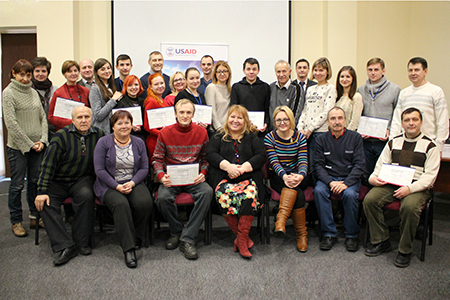Project Completed Trainings for Journalists

Over 140 journalists from seventeen oblast of Ukraine took part in a series of trainings “Media on Energy Efficiency: Competently, Objectively, Motivatingly”. The two-day interactive events were organized by the USAID Municipal Energy Reform Project in Ukraine, in cooperation with the Ministry of Regional Development, Construction and Housing and Communal Services and the State Agency for Energy Efficiency and Energy Saving.
This year, the USAID team decided to change the customary format of its trainings, and suggested not only intensive theoretical training, but also a practical part – it organized meetings with those who are actively implementing energy efficient technologies and are using alternative energy sources. The list of speakers included condominium chairmen and the heads of regional Condominium Clean Energy Resource Centers, representatives of the industrial facilities, and heads of educational establishments. They illustrated with their examples that energy saving under current conditions is becoming a recipe for efficient and feasible activities for everyone.
For instance, the journalists visited “Enzym” Company in Lviv, which uses modern equipment and technologies, including biogas extracted from production waste for its own needs. In this way, the company saves up to 7,000 m3 of natural gas a year. Odesa Boarding School # 97 demonstrated its solid fuel boiler, which operates on wood chips and pellets, saves over UAH 200,000 per heating season. In Dnipro, the participants visited the Hudzon condominium, which has not only managed to undergo a thermal modernization of the building in 7 years, but also to install an energy saving pumping station and an automated outdoor lighting system. With these measures, the condominium has decreased its communal bills and optimized the comfort and safety of the building entrances and of the building territory. In Zaporizhzhia, the journalists had a unique opportunity to visit a 1.1 MW solar power station in the village of Petropavlivka (Zaporizkyi district) which currently operates on a “green” tariff and supplies electricity to 500 village buildings. In addition, the journalists looked at the activities of Municipal Heating Networks – the first and only wet calibration station in Zaporizhzhia where heat and water meters are calibrated. The tariffs for meter calibration are the lowest in the city, and hot water meters are calibrated free of charge (cost of calibration is included in the tariff).
The second training day was given to the creative laboratories of “Editorial Board’24”. The journalists were grouped into “mini-editorial boards” where, on the basis of information received on the first day, they developed a concept and prepared one article from each group. The main task of the seminar was to show that the information can attract readers with its contents and without any “hot” headlines, and also can be useful and motivating for the consumers of housing and communal services.
At the end of every regional training, the participants shared with the organizers their impressions and feedback. Practically all the journalists mentioned the high level of speakers’ preparation, the high level of event organization, and stressed the importance and necessity of similar trainings in the future.









